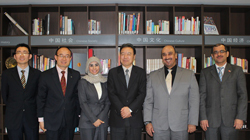

The Director General of the Institute of Public Administration (BIPA) Dr. Raed Mohammed bin Shams stated that the Institute is currently considering ways to develop the executive leadership in the Kingdom of Bahrain, through benefiting from the experience of the People’s Republic of China in the field of leadership development, explaining that benefiting from the experiences of the Far East, and in particular the Chinese experience, is an added quality that will contribute to raising the level of the next leadership programs, which will enable the Bahraini leaders to read and analyze the situations, dealing with different variables in addition to realizing the policies of government decision-making.
This came during a meeting between the Director General of BIPA and his accompanying delegation, with the Vice President of the China Executive Leadership Academy in Shanghai Mr. Jang Hashin – following the visit to the Chinese Academy of Governance in Beijing – where the delegation was given a brief on the strategy of the academy, its objectives and various programs, as well as aspects of training and development. Bin Shams explained that the convergence between the Chinese experience and the experience of BIPA in developing the Bahraini leaders, is a distinguished opportunity for development to be exploited optimally, as the Institute aims to activate the partnership with major Chinese leadership graduation institutions to strengthen seeking more from the leading Chinese experiences in the areas of building government leaders.
Bin Shams also praised the significant role played by the Chinese Academy in the development of leaders, where it aims to train the senior leadership in China with its distinct variety of ministers, undersecretaries and assistant undersecretaries, furthermore the Academy graduated many of the leaders and ministers internationally in many countries of the world from the East or the West alike.
For his part, the Vice President of the Academy praised the high standard achieved by BIPA in the preparation of leaders, stressing the similarity of training framework followed by the Institute with the Chinese model, which relies on the creation of a strong communication network, and benefit from the expertise of specialists in the arena of leadership, in addition to the field visits and focusing on the importance of media discourse, stressing the need for the exchange of experiences between the two countries with the aim of building a distinct model that contributes to the development of public administration.
Bin Shams pointed to BIPA's tendency to look closely into the global experiences in the field of public administration to meet the training needs of public sector employees in the Kingdom of Bahrain, and especially the experiences of leadership, in response to the decisions of the Cabinet and the Civil Service Bureau (CSB) and BIPA's Board of Directors, for the need to provide an integrated package of training programs that achieve the ambition and qualify national cadres to assume leadership positions in full efficiency and merit, thus building on the successes achieved in the current leadership programs such as the mandatory program (leaders) and the optional program (cadres).
